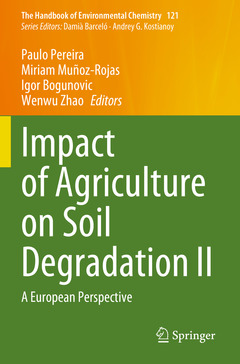Impact of Agriculture on Soil Degradation II, 1st ed. 2023 A European Perspective The Handbook of Environmental Chemistry Series, Vol. 121
Coordonnateurs : Pereira Paulo, Muñoz-Rojas Miriam, Bogunovic Igor, Zhao Wenwu

This is the second of two volumes that together provide a global overview of the impact of agriculture on soil degradation, tracing the most critical drivers like the use and abuse of agrochemicals, mechanization, overgrazing, irrigation, slash and burn agriculture, and the use of plastics.
Soil degradation caused by agriculture practices is a complex issue which depends on the interaction of social, economic, political, and environmental aspects. In this book, expert contributors elucidate the extension of the effects of agriculture on soil degradation in Europe, a continent with different cultures and political backgrounds that affect agricultural practices. Readers will also find in this book authoritative solutions to minimize the effects of agriculture intensification and land-use in this continent.
Divided into 12 chapters, the book offers a European perspective on soil quality and sustainable management, including case studies about the impact of chemical agentslike fertilizers, herbicides, pesticides, and soil acidification and microplastics pollution in agriculture practices from countries such as Croatia, Czech Republic, Estonia, Latvia and Lithuania, Germany, Portugal and Greece, Hungary, Iceland, Italy, Slovenia, Spain, Sweden, and Ukraine.
Given the breadth and depth of its coverage, the book offers an invaluable source of information for researchers, students and environmental managers alike.Chapter 1 Agricultural Soil Degradation in Croatia.- Chapter 2 Agricultural Land Degradation in the Czech Republic.- Chapter 3 Agricultural Soil Degradation in Estonia, Latvia and Lithuania.- Chapter 4 Agricultural Soil Degradation in Germany.- Chapter 5 Agricultural Land Degradation in Portugal and Greece.- Chapter 6 Agricultural Soil Degradation in Hungary.- Chapter 7 Agricultural Land Degradation in Iceland.- Chapter 8 Agricultural Land Degradation in Italy.- Chapter 9 Agricultural Land Degradation in Slovenia.- Chapter 10 Agricultural Land Degradation in Spain.- Chapter 11 Agricultural Land Degradation in Sweden.- Chapter 12 Agricultural Soil Degradation in Ukraine.
Paulo Pereira is a Full Professor at Mykolas Romeris University (Lithuania). He completed his Ph.D. at the University of Barcelona (Spain, 2010). Since 2014 he is the Head of the Environmental Management Laboratory (Mykolas Romeris University, Lithuania). In 2015 Professor Pereira was awarded by the Soil System Sciences Division as Outstanding Young Scientist. In 2020 was identified as one of the world's most cited researchers (Clarivate Analytics Highly Cited Researcher).In 2021 was elected as a full member of the world's most prestigious scientific research honour society Sigma Xi and recognized as one of the top (1%) researchers writing about soil in the past ten years (2011–2021) according to "Expertscape". In 2021 and 2022, Paulo was listed as amongst the world's 2% top scientists in the field of environmental sciences, according to Elsevier/Stanford University. He published 200+ scientific articles, 50+ book chapters, and edited 6 books as the main editor in the fields of fire and soil degradation. Professor Pereira serves as Associate Editor-in-Chief of the journal Geography and Sustainability, and Associate Editor of The Science of the Total Environment and Heliyon.
Miriam Muñoz-Rojas is a Senior Research Fellow at the University of Seville, Spain, and an Honorary Senior Lecturer at UNSW Sydney, Australia. Her research is focused on the conservation and restoration of soils and ecosystems. She is particularly interested in understanding plant-soil-microbe interactions and harnessing novel methodologies, including geo-tools, genomics, metabolomics, and eco-engineering, to promote ecosystem restoration and ensure the provision of key ecosystem services. Dr. Muñoz-Rojas has published over 70 scientific articles in top journals such as Science and Global Change Biology. She is a Commission Chair at the International Union of Soil Sciences and&nb
Date de parution : 09-2023
Ouvrage de 347 p.
15.5x23.5 cm
Date de parution : 05-2023
Ouvrage de 347 p.
15.5x23.5 cm
Disponible chez l'éditeur (délai d'approvisionnement : 15 jours).
Prix indicatif 295,39 €
Ajouter au panier